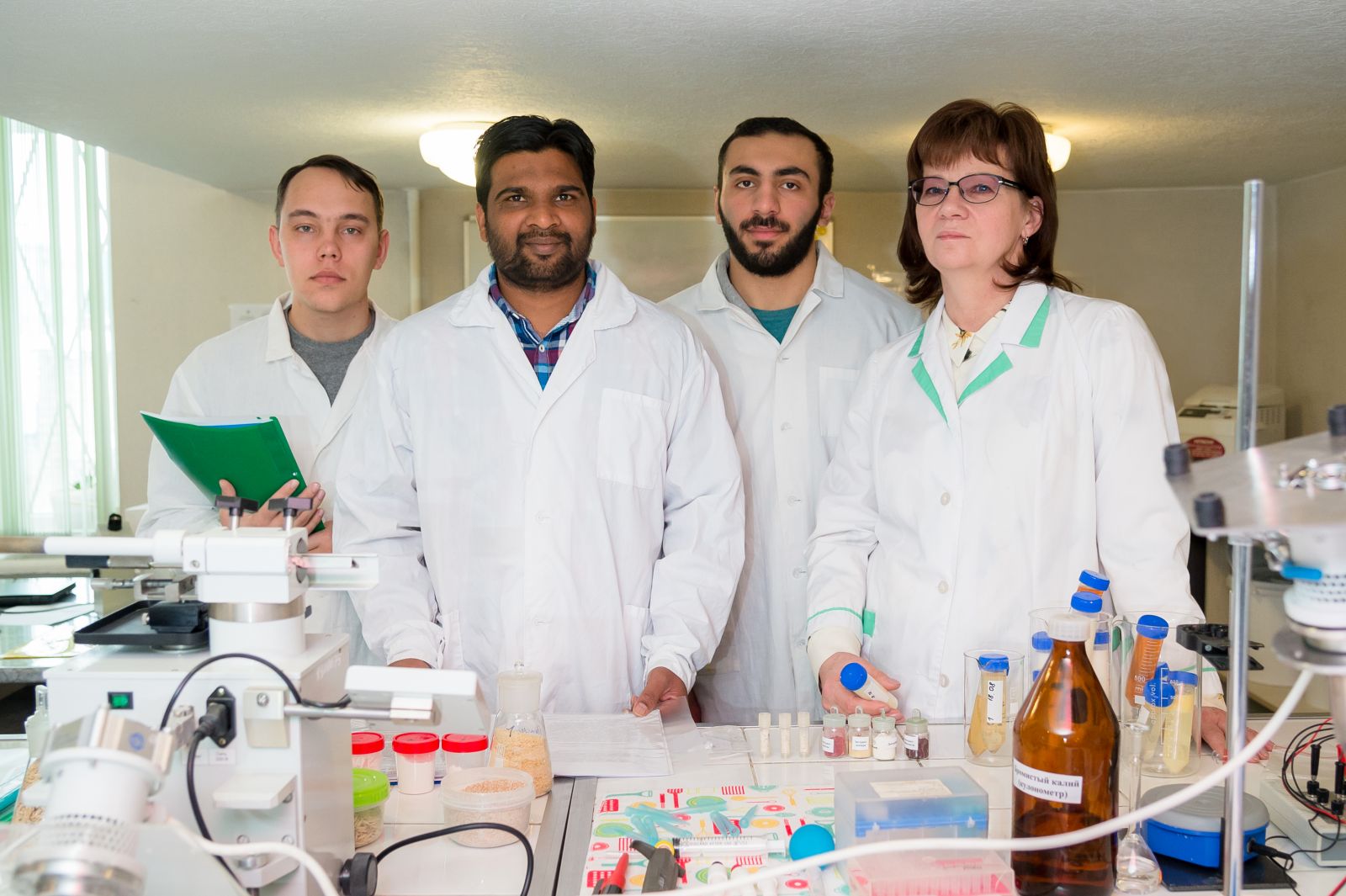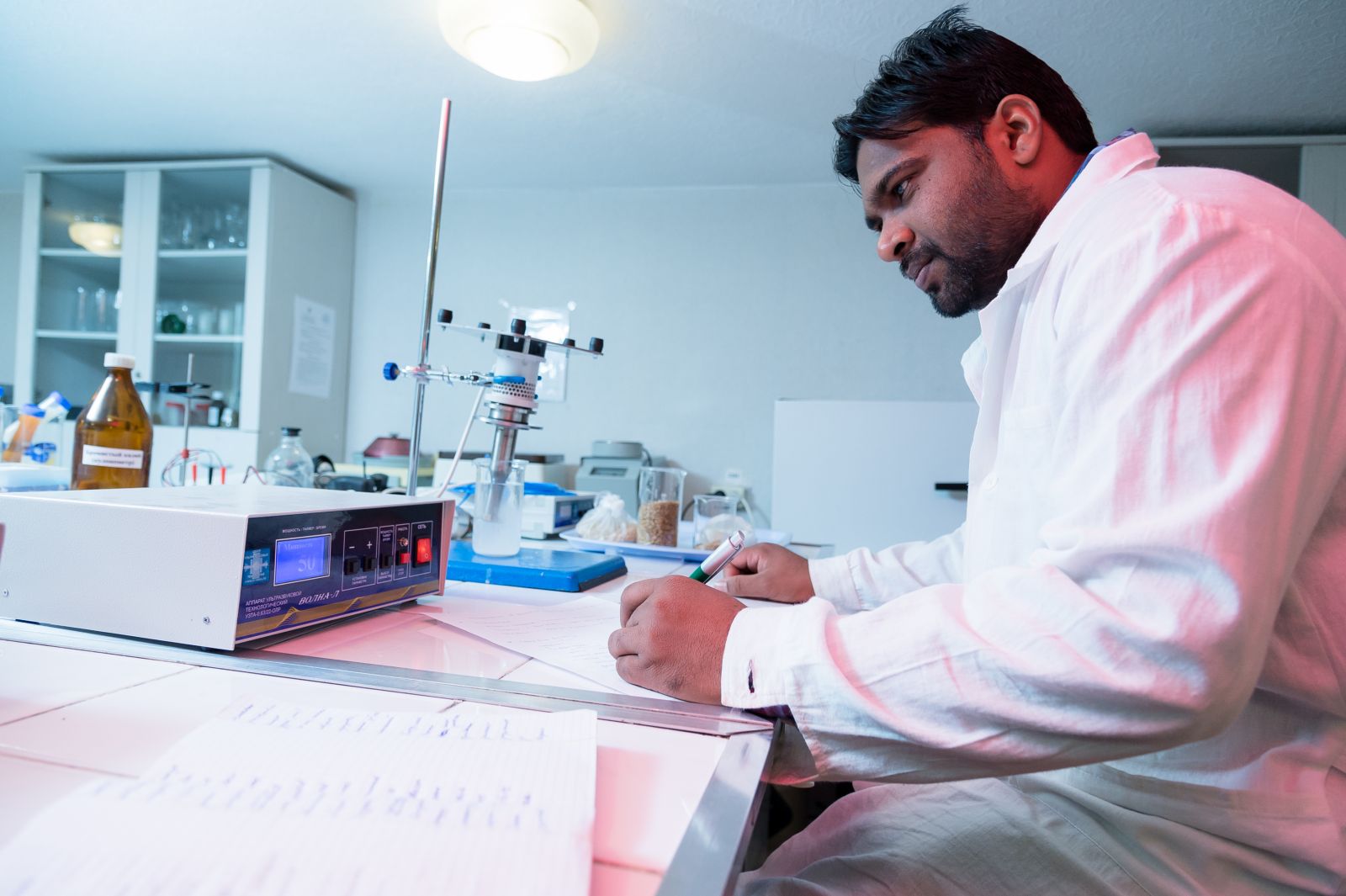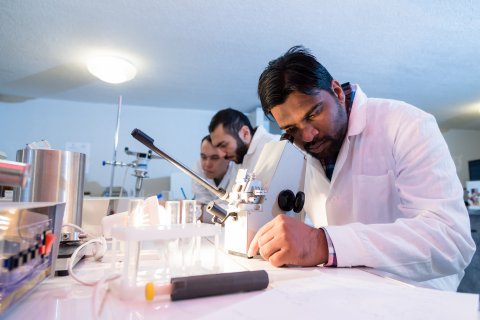Project-based learning at School of Medical Biology develops within the project entitled “Development of efficient technologies of grain disinfection”. Starting from January of 2019, a young researcher from India – postdoc Bagale Uday Dasharath – has started his research within implementation of Project 5-100 at SUSU. At the International Laboratory for Synthesis and Analysis of Food Ingredients, the young scientist is going to work on research in the sphere of encapsulation of biologically active components for food production.
In an interview with Bagale Uday Dasharath, SUSU’s Vice-Rector for International Relations Olga Yaroshenko, project leader, Doctor of Sciences (Engineering), Professor Irina Potoroko and the postdoc’s co-researcher Artem Malinin, we discussed the exposure of ultrasound on food products, participation of the young postdoc researcher in one of the key projects of the university, interaction of the postdoc with master’s degree students, specificity of postdocs’ admissions to the university, and many other things.
Bagale Uday Dasharath:
– How did you science career started?
– I got bachelor’s degree at North Maharashtra University (Jalgaon, India) in 2010. At the same university in 2014, I defended my master’s thesis on Paints and Polymers. I got a PHD degree in Chemical Engineering at National Institute of Technology in Warangal (India) under supervision of Doctor Shirish Sonawane.
– What is your sphere of expertise nowadays?
– Presently, I am working on development of polymers and emulsions for various types of coatings. The effect of encapsulation in a substance occurs due to intensification of processes of ultrasonic exposure (the effect of ultrasonic cavitation). The main goal of my research at South Ural State University’s Laboratory is to develop new approaches for obtaining food products of directed effect. We are working on invention of a film made of biodegradable material based on nanoemulsion for delivery of substances via an encapsulated shell.
– Are you planning on any joint publications on the project?
– I’ve known Irina Potoroko, my research advisor at SUSU, since 2016, and we already have a number of joint publications with affiliation of SUSU, indexed in such international databases as Scopus and Web of Science. They are two articles in a journal called Ultrasonic Sonochemistry.
Moreover, I have publications on the topic of my research connected with sonochemistry in such authoritative scientific journals as Protection of Metal & Physical Surface Chemistry (Springer) and Green Processing Synthesis (De Gruyter). Besides, three more articles on the topic of our joint research have already been sent to Chemical Bioresources and Bioprocessing Journal (Springer) and to an authoritative journal called Powder Technology (Elsevier).
The experience of involvement of postdoc scientists into research has already proved itself at SUSU. Involvement of postdocs promotes exchange of scientific and practical experience as well as promotion of recognizability of scientific schools at the international level.

SUSU Vice-Rector for International Relations, Candidate of Sciences (Pedagogy), Associate Professor Olga Yaroshenko:
– Attracting young postdoc scientists is one of the key objectives of the university within implementation of the programme for competitiveness enhancement called Project 5-100. Inviting postdocs from leading universities of the world allows the university to significantly improve its rates of publication activity, stay up-to-date with trends relevant for contemporary science, and enhance competitive ability of the university.
Young researchers, who have already got experience of working in authoritative laboratories, can pass on the priceless experience to our scientists as well as share their research skills and ideas.
In our Office, the issue of attracting young researchers who has got experience of working in leading universities in Russia and abroad to the university is responsibility of the International Research Collaboration. We are always happy to provide any type of assistance to our newly-come colleagues: we supervise the process of documents’ execution and provide mentorship within the entire period of their staying at the university.
Research advisor of Bagale Uday Dasharath, leader of the project entitled “Development of efficient technologies of grain disinfection’ Doctor of Sciences (Engineering), Professor Irina Potoroko:
– Over the last few years, researches connected with encapsulation of bioactive compounds for pharmaceutical sphere have been actively carried out all over the world. A significantly lesser number of research is connected with application of such approaches in food technology.
Together with Bagale Uday Dasharath, we are planning to carry out a research dedicated to development, design and production of systems of nanodelivery and interaction of nano-encapsulated biologically active compounds with food products at the International Laboratory for Synthesis and Analysis of Food Ingredients.
We started remote cooperation with Bagale Uday Dasharath in 2016. Together with other postgraduate students supervised by Shirish Sonawane, Bagale reported his research inquiries to us at a meeting held at the University in India. When we elaborated the encapsulation programme, he got in the list of young researchers who competed against each other on many parameters in order to get recruited as a researcher to SUSU Laboratory and conduct research on this topic. As a result, it was precisely Bagale Uday Dasharath whom we have chosen as a candidate for the position as a postdoc.
The direction of research in our cooperative work is connected with the possibility to use vector delivery of biologically active substances by the method of encapsulation. Presently, this research area is very perspective as it is targeted at minimizing the risks of occurrence of non-infectious diseases in the course of oxidative stress.
In the course of research, we and our new postdoc are going to work in two directions: formation of flavour of the new products, and development of systems for delivery of biologically active substances in corresponding systems of human body. We discussed the topic of joint research beforehand, and now in the process of experimenting we will try to find out, how exactly the encapsulated biologically active substances are going to build-in into the food matrix.


The postdoc’s co-researcher at the university is master’s degree student of a project-based learning group of specialty 19.04.01 Biotechnology, Artem Malinin:
– Together with Bagale Uday Dasharath from the Warangal University we are planning to continue applied research on our project within the sphere of agrobiotechnology, specifically the research dedicated to specificity of sprouting, disinfection and conversion of wheat and other grain crops.
Now I am actively working on the topic of deep conversion of grains, connected with the technology of starches extraction and their further modification. Within the subject of our research is possible development of ecologically pure materials on the basis of products obtained after deep conversion of grains. Nowadays we are at the very beginning of research concerning conversion of starches with the use of ultrasonic exposure. Among our goals is development of bioplastic materials on the basis of starch, which could replace polymers in the future.
We are researching a whole complex of grain crops: wheat, oat, barley. Moreover, together with Bagale Uday Dasharath, we started researching the effect of ultrasound on gum arabic.
Bagale Uday Dasharath’s experience is very valuable in our joint work! I think that the cooperation will be mutually beneficial; all of us will learn something new, and as a result we will be able to compete with other scientists’ research works in this sphere. Today, Bagale is only beginning to work at the Laboratory; he is gradually getting familiar with the university, getting involved into the joint activity and into the common environment. We have already visited the celebration of the Student Day in the main building, and he enjoyed it.
Bagale Uday Dasharath:
– It is freezing in the Ural, but I like it here so far: the accommodation conditions, the weather, the city itself. Of course, I am not used to such a climate so far, but the cold gets compensated with new experience. It is very interesting to work here; I am surrounded with friendly people who are always ready to help. I think that Sonochemistry is the science of the future; I see a lot of potential in this science and I am sure that our current joint researches at SUSU’s Laboratory for Synthesis and Analysis of Food Ingredients will bring us to new significant scientific results. Thanks to research in the sphere of encapsulation of biologically active substances and obtainment of ecologically pure products with new properties, we will be able to fight environmental pollution and improve the quality of people’s life.




